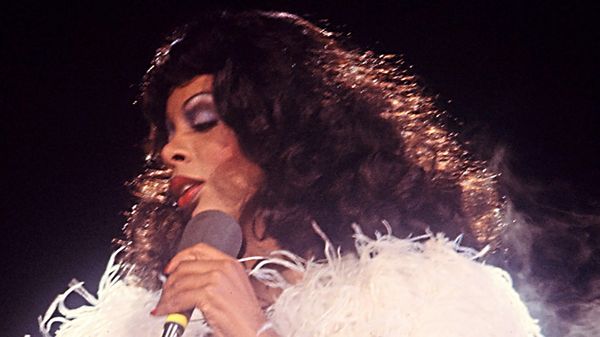Eye For Film >> Movies >> Love To Love You, Donna Summer (2023) Film Review
Love To Love You, Donna Summer
Reviewed by: Amber Wilkinson

When it comes to documenting someone’s life on film, the trick is to find a specific angle by which to hold it up to the light. Those who don’t - and there have been plenty of them - risk doing little more than taking you through the main points in a manner little more engaging than a textbook. Love To Love You, Donna Summer, has perhaps the best prism of all to observe the life of the Queen of Disco through - that of her family.
It means that though this film has plenty of career and performance detail, co-directors Roger Ross Williams and Brooklyn Sudano - Summer’s youngest daughter - don’t feel honour-bound to work their way through the minutiae of her back catalogue, opting instead to focus on the woman behind the performances. While this may not entirely satisfy fans who are looking for a deep dive into the music, it offers more in terms of emotional overview than you usually get from this sort of doc.

The idea of performance is also key to a film which suggests that Summer viewed each song as a sort of individual role that she would slip into the storytelling of, as someone puts it, “She thought in theatre”.
Williams and Sudano immerse us from the off, as the erotic groans of Love To Love You Baby crank up while we watch Summer gyrate behind the mic, the music later giving way to the opposing forces of her ethereal floating vocal and the drum machine disco beat of I Feel Love. When you hear that her mother told her after hearing it, “I’m never going to be able to go to church again” you think, amen, good plan.
Her ability as a showstopper is coupled with Sudano’s intelligent line of questioning as we hear, in voice-over, various members of her family, including aunts, sisters and even Summer’s abusive former boyfriend Peter Mühldorfer talk about elements of her life. Rather than break the spell of Summer with talking heads, these conversations are carefully edited by Enat Sidi and Jon Smith so that they float like a counterpoint alongside the archive footage and words of Summer herself.
Although the film charts her early success in Germany and return to the US, with a decent stock of video and concert footage, the emphasis of the discussion is on her personal life and emotional feelings about this success. Family archive helps to show the woman behind the sparkling bodysuits. Sudano and the rest of the family deserve a lot of credit for being willing to talk not only about the abuse by a pastor that Summer suffered as a child but also about the fact that she wasn’t always a successful mother. There are some similarities between Summer’s trajectory and that of Little Richard - whose life has also brought, less successfully, to documentary this year - not least in becoming a queer icon and then falling spectacularly from grace in the eyes of their fans in the midst of born-again fervour.
The film doesn’t shy away from her late-career declaration on-stage: “God didn’t make Adam and Steve, he made Adam and Eve” - although they suggest it wasn’t a premeditated remark or meant with malice. What happened next, was an understandable outcry from the gay community, fueled by claims that Summer had made considerably worse comments about God’s judgement and AIDS in an interview - something she denied. Summer’s husband Bruce Sudano acknowledges that they handled all of this very badly - essentially ignoring the situation in the hopes it would go away, until it didn’t. The filmmakers don’t labour the point and, one might say they quite bravely leave us to draw our own conclusions. The lingering sensation is not of a sinner or a saint but of a woman as multifaceted and sparkling as a glitterball, fractured in some ways but still quite brilliant.
Reviewed on: 24 Feb 2023














